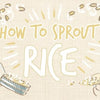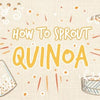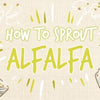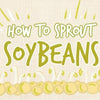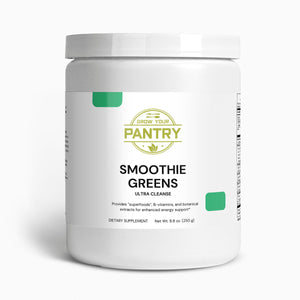How To Sprout Alfalfa: The Complete Guide
Alfalfa, also known as Lucerne, is a perennial legume that is believed to have originated from south-central Asia. The plant was brought to Europe around 490 BC during the Persian invasions. Most of the alfalfa growing that goes on is for livestock use as fodder. This guide will instead focus on alfalfa sprouts, their benefits, and how to prepare them.
Not Much Time? Skip To What You'd Like To Learn...
-
What Are Alfalfa Sprouts?
-
What Do Alfalfa Sprouts Smell Like?
-
What Do Alfalfa Sprouts Taste Like?
-
How Long Does It Take Alfalfa to Sprout?
-
Why Sprout Alfalfa?
-
Health Benefits Of Sprouted Alfalfa
-
Do All Alfalfa Seeds Sprout?
-
How To Select And Buy Alfalfa Seeds For Sprouting
-
How to Sprout Alfalfa
-
YouTube Sprouting Methods
-
Buying Alfalfa Sprouts
-
How to Eat Sprouted Alfalfa
-
Recipes
-
How to Make Raw Alfalfa Sprouts Edible For Low Immunity Groups
-
Boiling & Steaming Method of Killing Bacteria in Alfalfa Sprouts
-
Other Recommended Sprouted Seeds
-
Common Questions
What Are Alfalfa Sprouts?
Alfalfa sprouts are 3 to 5-day old alfalfa shoots. When dry, mature alfalfa seeds are activated by soaking for at least 12 hours, the germination process will automatically start. The sprouts reach optimal flavor by the time they are 2 inches tall, after which they are harvested.
What Do Alfalfa Sprouts Smell Like?
Fresh alfalfa sprouts have a fresh earthy tea-like smell. If your sprouts have developed a sour or pungent smell it's time to throw them away as they are likely to be rotting or infested with fungi cultures.
What Do Alfalfa Sprouts Taste Like?
Alfalfa sprouts have a mild nutty flavor and a crunchy texture. The sprouts don't have to be cooked as the flavor is readily available; besides, the tiny yellow to dark green leaves growing on the sprouts are too delicate to cook.
How Long Does It Take Alfalfa to Sprout?
Alfalfa seeds germinate at a much faster rate compared to other legumes and will have sprouted by the third day. The young shoots are usually ready to harvest by the third day if they are kept under optimal conditions in terms of temperature (65-85°F) and watered regularly (after every 8 to 12 hours).
Why Sprout Alfalfa?

1. Increased Nutrition Count
The sprouting process unlocks the stored nutrients in the seed, making them readily available for absorption upon digestion. Alfalfa seeds are rich in vitamins C and K, minerals like copper, manganese, magnesium, and iron.
2. It's Economical
Sprouting alfalfa seeds makes them worth more in terms of nutritional value. The sprouting process also involves a drastic increase in size by over 400%. Sprouting a handful of alfalfa seeds will give you up to 8 oz worth of sprouts, which can be stored in the fridge for later use.
3. It's The Only Way To Consume Alfalfa
Alfalfa seeds are rather tiny making them almost impossible to cook and eat whole. This leaves sprouting as the only decent way to enjoy alfalfa seeds.
The seeds contain a compound known as canavanine. This compound inhibits the absorption of normal proteins making existing lupus condition worse. The sprouting process reduces the levels of canavanine, making the alfalfa sprouts a great source of essential nutrients.
4. Can be Done Indoors
Alfalfa sprouting does not require any specialized care; all you need is a flat-sided mason jar or a sprouting kit. The seeds will sprout much faster indoors as the temperature is within the optimum range.
Health Benefits Of Sprouted Alfalfa
1. Cholesterol Control
Alfalfa sprouts contain compounds such as saponins, which reduce the level of bad LDL cholesterol. This reduction leads to an increase in good HDL cholesterol. Having healthy cholesterol levels goes a long way in preventing heart disease and other health complications. One study found that eating 40 grams of alfalfa sprouts per day did decrease total cholesterol by 17%. Reference: Link.
2. Improved Metabolism
While research is still ongoing, alfalfa sprouts have been shown to lower blood sugar levels and improve metabolic health when consumed. In fact, alfalfa was used to treat diabetes in ancient times. This is achieved by partly increasing insulin production in the pancreas. Reference: Link.
3. Relieving Menopause Symptoms
Alfalfa sprouts contain phytoestrogens that ease menopause symptoms. This is due to the fact that phytoestrogen behaves like estrogen, and its presence in the bloodstream can trigger a reduction in the symptoms associated with the decline of estrogen levels. Consuming alfalfa sprouts can, therefore, reduce some of the symptoms such as hot flashes and night sweats. Reference: Link.
4. Antioxidant Effect
Alfalfa sprouts are rich in antioxidants and bioactive plant compounds. These react with free radicals, which are byproducts in the metabolism process. Reacting with free radicals prevents genetic damage to the cells, which normally results in cancer. Alfalfa sprouts have been used for over 300 years in ancient medicines. Ref: Link.
5. Low Calorie
With as little as 8 calories per 1 cup, alfalfa sprouts are suitable for a low-calorie diet . This makes it a perfect source of vitamins and minerals without any additional calorie intake. The low calorie also aids in weight control with the reduction in calorie intake. Ref: Link.
Nutritional Value of Alfalfa Sprouts (per 1 cup serving)
Macro Nutrients
Protein: 1.3 g
Calories: 7.6
Micronutrients
Vitamin A: 5 mg
Vitamin K: 10.1 mcg
Vitamin C: 2.7 mg
Folate: 11 mcg
Calcium: 10.6 mg
Iron: 0.3 mg
Magnesium: 8.9 mg
Phosphorus: 23 mg
Potassium: 26 mg
Sodium: 2 mg
Do All Alfalfa Seeds Sprout?
Mature alfalfa seed will sprout when they get exposed to moisture and kept within 65-85°F (18- 29 ºC) temperature. The seeds have to be raw, so you cannot use pasteurized seeds as they will not germinate.
How To Select And Buy Alfalfa Seeds For Sprouting

1. Only Go For Sprout-Ready Varieties
When shopping for alfalfa seeds to sprout, only go for products that have been clearly marked as sproutable. These seeds are specially harvested and packaged while still raw to increase the sprouting rate.
2. Avoid Cracked and Milled Seeds
Seeds can only germinate when they are intact, so avoid cracked and milled seeds as they will just rot instead of sprouting. Partially cracked seeds can sprout, but they should be avoided as they might have been exposed to fungi, which can be problematic.
3. Brand Presence
There are hundreds of alfalfa seeds brands on popular online stores like Amazon, making it almost impossible to settle on the best product. You can, however, reduce the odds by going through customer feedback and reviews.
How to Sprout Alfalfa
Equipment Required
-
Mason jar or a sprouting container/kit
-
Mesh sprouting lid to fit the mason jar
-
Large bowl
Ingredients Required
-
Sprout-ready alfalfa seeds- 2 tablespoons
-
Filtered water
Method for Sprouting
1. Rinse the sprout-ready alfalfa seeds and remove any debris or floating matter
2. Place the seeds in a large bowl and half fill it with filtered water. Soak the seeds for 8 hours or overnight
3. Drain the water and rinse the activated alfalfa seeds
4. Place the seeds in a mason jar or a sprouting kit. Cover the jar with a mesh sprouting lid, which keeps out contaminants while also allowing air to flow freely into the jar
5. Keep the jar inverted over a large bowl at an angle which will allow any remaining moisture to drain out
6. Rinse and drain the sprouts every 8 to 12 hours for 3 days
7. When the sprouts start growing, you can transfer them into indirect light, which greatly improves the growth of tiny green leaves. Avoid direct sunlight as it can get too hot and harm the sprouts.
YouTube Sprouting Methods
The guide focuses on how to sprout alfalfa seeds using a quart jar in three easy steps with a focus on being economical.
This video guide relies on a large colander lined up with paper towels to act as a homemade sprouting kit.
The tutorial focuses on how to sprout alfalfa seeds using a mason jar equipped with a plastic sprouting lid to make the entire process simple to deal with.
Buying Alfalfa Sprouts
Where To Buy Alfalfa Sprouts From
Due to their short shelf-life, alfalfa sprouts are not a common product in most stores. Instead, they opt to stock up on alfalfa sprout-ready seeds, which have a much longer shelf life.
Local Farmers Market - Fresh alfalfa sprouts can be found in most farmer's markets; these are mainly from small scale growers. Ensure that you check the freshness of the sprouts; generally, the stems should remain firm if the sprouts are fresh.
Grocery Stores - Local grocery stores are more likely to stock up on fresh alfalfa sprouts. Some of the chain stores that often stock up on alfalfa sprouts include Jimbo's, Tony's, Ultra Foods, and Village market.
What to Look for When Buying
1. Quality
Alfalfa sprouts are best bought while fresh; this way, they will provide a nutrient-dense meal. Avoid sprouts that look too yellowish or have withered shoots.
2. Packaging
Like all other sprouts, alfalfa sprouts should be packaged in sanitized conditions to reduce the possibility of contamination. Sprouts should be stored in clear plastic containers that are airtight sealed to keep off bacteria and fungi culture.
How to Eat Sprouted Alfalfa
Alfalfa sprouts can be eaten either cooked or raw. The sprouts can, therefore, be applied in several recipes. While heat treatment can alter the flavor of the sprouts, it's highly recommended as a way of eliminating any harmful bacteria or fungi that might be present in the sprouts.
Can you Eat Sprouted Alfalfa Raw?
Yes, raw alfalfa sprouts are perfectly edible and can be consumed raw while still retaining the health and nutritional benefits.
Are They a High-Risk Food?
Alfalfa sprouts are considered to be a high-risk food just like other raw sprouts due to the high likelihood of contamination with harmful culture during the germination process. The wet conditions normally involved in rinsing the sprouts can provide the right conditions for such cultures to grow.
Recipes
1. Crudité's Alfalfa Sprouts Salad
This recipe was inspired by Soscuisine.com.
Ingredients
-
2 cups raw alfalfa sprouts
-
3 tablespoons extra virgin olive oil
-
4 teaspoons lemon juice- freshly squeezed
-
8 button mushrooms- thinly sliced
-
2 carrots- grated
-
2 tomatoes- sliced
-
½ arugula
-
Salt to taste
-
Ground pepper to taste
-
40 g parmesan cheese- shaved into curls
Instructions
1. In a small bowl, make a lemon vinaigrette: add lemon juice, pepper, salt, and the oil. Use a fork to beat the vinaigrette until it's emulsified.
2. Prepare the carrots and mushrooms and place them into two separate bowls.
3. Add half of the lemon vinaigrette to each of the bowls and toss well
4. Shave the parmesan cheese and add the curls to the mushrooms
5. Prepare the vegetables: slice the tomatoes and add the spin-dried arugula and alfalfa sprouts. pout the vinaigrette over the vegetables and season with pepper and salt before serving
2. Alfalfa Salad with Peanut Dressing and Roasted Capsicum
This recipe was inspired by: tarladalal.com.
Ingredients
-
1 red capsicum
-
1 green capsicum
-
1 yellow capsicum
-
2 cups alfalfa sprouts
-
½ teaspoon olive oil
-
½ cup roasted peanuts- coarsely crushed
-
2 tablespoon lemon juice
-
1 teaspoon dry red paprika flakes
Instructions
1. Use a brush to spread a little oil evenly on the red capsicum. Use a fork to hold the red capsicum over an open flame until its sides turn black
2. Allow the red capsicum to cool before washing it in cold water. Pill off the burnt skin and remove the seeds and stem. Discard the removed parts and cut the pilled capsicum into cubes
3. Repeat step 1 and 2 for the yellow and green capsicums
4. Prepare the peanut dressing by combining the roasted peanuts, olive oil, lemon juice, and dry paprika flakes in a bowl and mix until all of the ingredients are evenly mixed and set aside
4. Combine the sprouts, cubed capsicums and peanut dressing in a salad bowl and toss well before serving
3. Sprouted Alfalfa Salad with Crunchy Apple and Lemon Creamy Dressing
This recipe was inspired by: epicurious.com.
Ingredients
-
2 oz alfalfa sprouts
-
6 oz fresh chopped spinach
-
4 red apples- thinly sliced
-
Juice from half a lemon
-
1 cucumber- chopped
-
½ oz fresh mint
-
Sandwich spread- 1 cup
Instructions
1. In a large bowl, combine the lemon and apples which prevents the apples from turning brownish, add chopped mint, almonds, cucumber and half of the spread
2. Divide the apple mixture as per the serving bowls and top off with alfalfa sprouts and extra spread if desired
4. Stir Fry Alfalfa Sprouts
This recipe was inspired by: confessionsofanover-workedmom.
Ingredients
-
1 cup alfalfa sprouts
-
2 cups chopped and cooked ham
-
1 bag of frozen cauliflower
-
1 teaspoon minced garlic
-
1 tablespoon extra-virgin oil
Instructions
1. Heat the olive oil over medium heat and add the garlic, sauté until it turns soft
2. Add the ham and frozen cauliflower and sauté until they are well cooked
3. Serve with alfalfa sprouts
How to Make Raw Alfalfa Sprouts Edible For Low Immunity Groups
To prevent the possibility of bacterial infection occurring, raw alfalfa sprouts must undergo heat treatment before being consumed by low immunity groups.
Who's At Risk
Pregnant Mothers - Pregnancy usually leads to a drop in the overall immunity of the expecting mother; this makes it much easier for bacteria and fungi culture to invade the digestive system when consuming raw alfalfa sprouts.
Chemotherapy Patients - Chemotherapy leads to a reduction in the population of immune cells; opportunistic bacteria can invade such a system leading to infections after consuming contaminated raw alfalfa sprouts.
Patients On Immunosuppressants - These are drugs that weaken the immune system making the patients more vulnerable to bacterial infections.
Children And The Elderly - Children have a higher risk of contracting a bacterial infection, primarily via what they eat. The elderly, on the other hand, have old and failing immune systems, which increase the chance of developing infections.
AIDS Patients - Alfalfa sprouts may be contaminated with harmful bacteria, which can be quite troublesome to AIDS patients due to their weakened immune systems.
Boiling & Steaming Method of Killing Bacteria in Alfalfa Sprouts
Exposing the alfalfa sprouts to 160 ºF (71ºC) will kill most of the bacteria and fungi cultures, thus reducing the risk of foodborne diseases. However, if you are using a recipe that will require the sprouts to be stir-fried or added into stews and soups, then there's no need to boil the sprouts as they will be disinfected by the heat involved in the cooking process.
Steaming and blanching will also serve the same purpose as boiling but with the added advantage in that the sprouts get to retain their natural texture and flavor.
Equipment Required
-
Large pot
-
Wooden steam bucket (optional)
Instructions
1. Halfway fill a large pot with water and bring to boil over medium heat
2. If you are boiling the sprouts: add the sprouts into the pot of boiling water and allow them to boil for 5 minutes
3. If you are steaming: place the wooden steam bucket in the pot of boiling water and add the sprouts into the bucket and cover it. Allow the sprouts to steam for 10 minutes.
Can Parrots And Birds Eat Alfalfa Sprouts?
Yes, alfalfa sprouts can be fed to parrots and other birds. The sprouts are not only packed with nutrients, but they are also a cheap source.
Other Recommended Sprouted Seeds
Alfalfa sprouts are just one of the many sprouts you can consume. Generally, all sprouts have a significant nutritional increase compared to dry seeds.
1. Almond Sprouts
2. Chickpeas Sprouts
3. Lentil Sprouts
4. Soybean Sprouts
5. Broccoli Sprouts
Common Questions
How Do You Make Alfalfa Sprouts?
Alfalfa seeds can be sprouted by initially soaking them overnight or for at least 12 hours. The seeds are then rinsed, drained and stored in a sprouting container where they are rinsed and drained every 8 to 12 hours for 3 to 6 days.
How Long do Alfalfa Seeds Take to Sprout?
Alfalfa seeds take 2 to 3 days to sprout and are usually ready to harvest within 3 to 6 days.
Is It Safe to Grow Your Own Alfalfa Sprouts?
Yes, it's perfectly healthy to grow your own alfalfa sprouts at home.
Why Can't I Find Alfalfa Sprouts?
Alfalfa sprouts are rare due to their perishable nature; stores rarely stock up on them.
Can You Eat Alfalfa Sprouts Raw?
Yes, raw alfalfa sprouts are perfectly edible.
How Long Should You Soak Alfalfa Seeds?
Alfalfa seeds should initially be soaked for 8 to 12 hours.
How Do You Plant Alfalfa by Hand?
Due to their small size, alfalfa seeds can only be sawed by gently sprinkling a spoonful of the seeds by hand instead of trying to plant each individual seed.
How Hard is It to Grow Alfalfa?
Alfalfa sprouts are easy to grow, you just need a good sprouting medium such as a quart jar equipped with a sprouting lid.
How Do You Pronounce Alfalfa Sprout?
Listen to the pronunciation "al·fal·fuh".
Where Does Alfalfa Grow Naturally?
Alfalfa can be found growing naturally in the wild in southwestern Asia.
Can You Grow Alfalfa Indoors?
While you cannot grow the alfalfa plant indoors, you can grow alfalfa sprouts.


